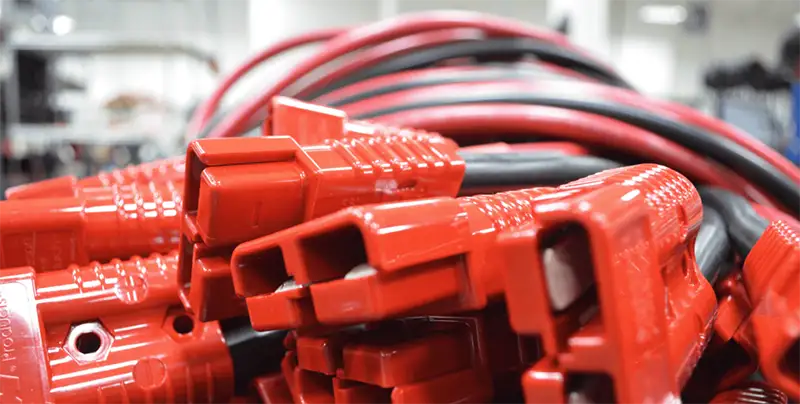
What Is the Difference Between a Cable Harness Assembly and a Wire Harness Assembly?
Cables and wire harnesses are both responsible for supplying electrical components with power, organizing cables and wires to optimize space, and providing them with some manner of protection from environmental conditions. Despite their functional similarities, however, these assemblies are not interchangeable. Each has its unique advantages and optimal applications. At PGF Technology Group, Inc., our team can assist you in finding the right assembly for your project.
Just as these assembly types are two different products, the same is true of wires and cables. A wire is a strand of electrically conductive metal like copper or aluminum that can transmit power as well as information. A cable, then, is made up of multiple wires that are usually joined in a braided or bonded configuration.
The key variation between the two assemblies has to do with how protected their cables or wires are from chemicals, moisture, dust, extreme temperatures, and friction.
Cable Assemblies
Cable assemblies bundle wires or cables together for organization and efficient electrical system operation. Of the two assembly types, cable assemblies are best suited to outdoor applications. They are superior for withstanding environmental stress because they utilize a durable cover of materials such as vinyl, thermoplastic rubber, or shrink-wrapped thermoplastic. This robust insulating sheath safeguards internal cables from high heat, dirt, or other contaminants, detrimental weather, compressive force, abrasion, and more.
Wire Harnesses
Wire harnesses work well as cable system organizers, particularly in grouping smaller internal wires or cables for added connectivity. However, while these assemblies do include a protective casing to prevent short-circuiting in the wiring, it is far less rugged than a cable assembly cover. Instead, the grouped cables and wires in wire harnesses typically have their outer coverings already for that protection. While the assembly does group them in one harness, their sheaths still make it easy to see individual cables. Additionally, these individual sub-assemblies allow for highly complex projects that are adaptable for many unique uses. The harness’ simple outer sheath of thermoset materials or thermoplastic helps protect the wires and cables from their environment for indoor applications.
Looking for a prototype cable or wire harness solution? Make sure to download our free eBook.
Cable Assembly and Wire Harness Advantages
Cable assemblies and wire harnesses increase organizational and spatial efficiency. They also improve operational safety by preventing electrical fires and taming loose wires. However, each assembly type has its advantageous qualities. The covers that jacket cable assemblies are durable and strong, enabling more versatile applications as they can withstand a wider variety of environmental conditions. Also, as the internal bundled wires are all contained within a single outer sheath, it makes them more accessible for threading within smaller areas.
Wire harnesses are ideal for their ease of installation and simplified maintenance, resulting in reduced labor time. Providing less protection, wire harnesses work best indoors. This characteristic, added to their simplistic design, typically makes them more affordable. Also, the outer covering will still safeguard against moisture or chemical solvents.
Applications of Cable and Wire Harness Assemblies
Given the assemblies’ strengths, wire harness and cable assembly applications are varied, spreading across diverse industries.
Cable Assembly Applications
Cable assemblies organize or facilitate safe wiring in the following applications:
Military
- Flight Simulators
- Ground Equipment
- In-Flight Medical Systems
- Links for Field Communication
- Remote Control Weaponry
- Navigation Systems
- Rugged Computers
Aircraft
- Cockpit Instruments
- Drones and Unmanned Aerial Vehicles (UAVs)
- Electronic Systems for In-Flight Entertainment
Automotive and Transportation
- Data Transmission Systems
- High-Voltage Current Transmissions
- Navigation Systems
Electronics
- Audio Systems
- Communication Systems
- Flat-Panel Displays
Wire Harness Applications
Wire harnesses allow for orderly wire organization in:
Aerospace
- Aircraft Power Transmission
- Airplane Engines
- Communications Systems
- Drones
- Satellites
Automotive
- Dashboards
- Lighting and Turn Signals
- Navigation Systems
- Engine Bays
Healthcare
- Crash Carts
- Dental Equipment
- Diagnostic Equipment
- Imaging Equipment
Robotics and Automation
- Assembly Line Systems
- Automated Computer Numerical Control (CNC) Machines
- Computerized Systems, Servers, and Electronics
- Data Transmission
- Power Distribution
Cable and Wire Harness Solutions from PGF Technology Group
At PGF Technology, we pride ourselves on providing high-quality, cost-effective wire harnesses and cable assemblies for industry compliance in some of the most demanding electrical applications. Backed by over 50 years of ISO-certified design and manufacturing experience, our team can work with you to determine your installation requirements, space limitations, power needs, and environmental challenges to develop a reliable assembly solution tailored to your specifications.
Our comprehensive capabilities for residential, industrial, and commercial applications include:
- Product development
- Prototyping
- Design and Inspection Support
- Fabrication and Manufacturing
- Turnkey Component Assembly
Partner with PGF Technology
Determining the appropriate cable and wire harness assembly for your application will keep your systems and workspace organized, compliant, and functioning efficiently. PGF Technology specializes in assembly creation, with capabilities for C-Track cables, D-Subminiature cables, motor cables, sensor cables, data link assemblies, potting, and more. Contact us to learn about our electronic manufacturing solutions, or request a quote today.








